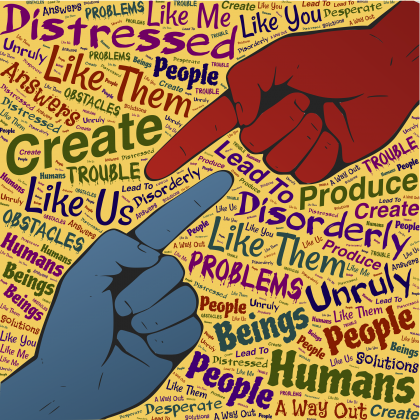Who Is My Neighbour?
Kate Whittaker Cousino | Jun 18, 2018
It used to be that people who preached tolerance worried about the homogeneity of geographic communities. If diversity in relationships leads to tolerance, then homogeneity makes room for ignorance. The non-geographic relationships of the internet must have appeared at one time like a beacon of hope, a way to build relationships and encourage dialogue between people who might never have met otherwise.
It certainly can still be that, but it can also be used to screen out differences in belief before any relationship is even attempted. Or, more troubling yet, it can be the place isolated people turn to find a sense of belonging—imbuing the online communities they found with a significance, weight, and influence that the ideologically-minded can exploit to promote radicalization.

If our fear of trusting “the wrong people” leads us to strict ideological purity tests for friendship, we make ourselves vulnerable to this same movement towards extremes, a movement based on false dichotomies: If you aren’t with me, you’re against me.
There is no middle ground, there is no nuance, there is no room for different experiences or opinions. There’s no distinction between essential points of unity and non-essential areas of custom or taste, no space for people of goodwill to disagree.
Vulnerability and shame researcher Brene Brown writes,
We normally don’t set up false dilemmas because we’re intentionally bullshitting; we often rely on this device when we’re working from a place of fear, acute emotion, and lack of knowledge. Unfortunately, fear, acute emotion, and lack of knowledge also provide the perfect set-up for uncivil behavior. This is why the bullshit/incivility cycle can become endless.
"Uncivil behaviour" may be the outcome of normal political polarization, but the inevitable end of extreme polarization that repudiates any possibility of dialogue, relationship, or change between "enemies" is something more than incivility—it is violence.
How can it be anything else? If the Other is experienced as a threat to every person and idea you care about, and relationship with anyone associated with the offending group is considered suspect and itself threatening, then there is no avenue for conversion or change. The Other cannot be reduced in power through empathy or reason-based conversion or persuasion—they can only be reduced through coercion, whether social, emotional, legal, or physical.
This is a road that leads to some very dark places.

Am I saying all ideologies are equivalent? Not even close. Ideologies which deny the inherent value of the human person, dividing humanity into more and less valuable subsets, are pernicious and must be vigorously repudiated and refuted. While any community united by shared belief or opinion is vulnerable to the creeping movement of ideological isolationalism and false in-group/out-group dichotomies and all the other communal emotional responses to fear, that doesn't mean that there aren't important differences in the core ideologies or beliefs which unite each group, or real historical reasons to feel fear or desire redress.
Made to choose between historically oppressed group A whose fear is based on centuries of discrimination, exploitation, and debasement, and historically advantaged group B whose fear is based on confusion and insecurity over shifting dynamics in power and fear of change, I'd throw my weight in with group A.
But I don't want to ever lose sight of the truth that the same emotional, human drives feed into both groups. None of us is immune. We need the moderating influence of non-ideological relationships.
That so-human fear of vulnerability and desire for security through belonging may be at the root of group polarization, but I believe—I hope—that they can also be the key to reversing it.
Image credits: Crowd image and fingerpointing image both via Pixabay.
